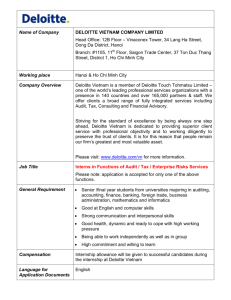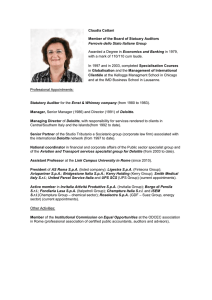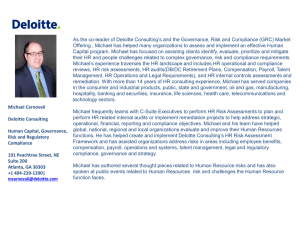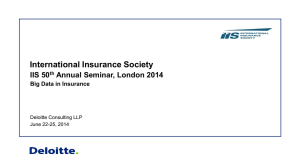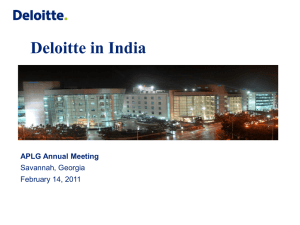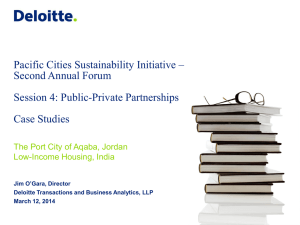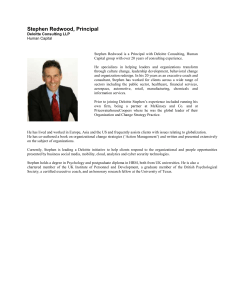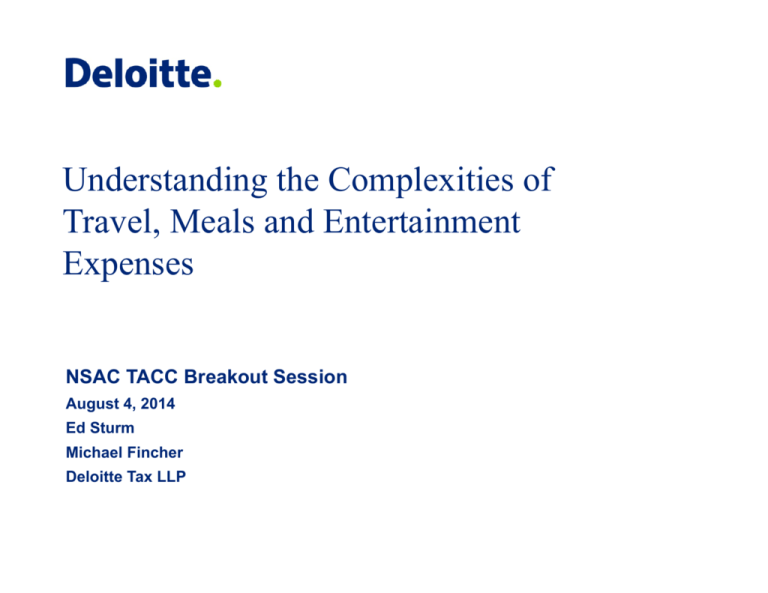
Understanding the Complexities of
Travel, Meals and Entertainment
Expenses
NSAC TACC Breakout Session
August 4, 2014
Ed Sturm
Michael Fincher
Deloitte Tax LLP
Introduction and Agenda
Agenda
Tax Deductibility of Travel, Meals and Entertainment Expenses
Documentation Requirements
Potential for Income Inclusion with Regard to Employees
Current IRS Examination Trends
Q&A
2
Copyright © 2014 Deloitte Development LLC. All rights reserved
Tax Deductibility of Travel,
Meals and Entertainment
Expenditures
General Construct of M&E Tax Deductibility
Meals and entertainment generally subject to 50% limitation unless a
specific rule leads to 100% deductibility or 100% limitation
“M&E is just 50% of a number”…..true but what number do we multiply
by 50%?
M&E that should be subject to 50% limitation on tax return is generally
not the number recorded to M&E accounts for book/financial statement
purposes
General rules typically have various exceptions that cause deductibility
to be higher or lower than general rule
Difficulty in applying M&E rules typically a function of:
- Large volume of transactions
- Applying detail tax rules to large volumes of transactions
4
Copyright © 2014 Deloitte Development LLC. All rights reserved
Items Generally Subject to 50% Limitation
Employee travel meals
Client meals
Client entertainment
Recreation events for employees that do not satisfy the highly
compensated nondiscrimination requirements
Conference/seminar meals for employees where value per person
exceeds limits on frequency & value
Note: Under IRC § 274(n) all meals and entertainment are 50% limited
unless a specific exception applies
5
Copyright © 2014 Deloitte Development LLC. All rights reserved
Items Generally 100% Deductible
Non-meal expenses
Employee recreation items satisfying the highly compensated
requirements
Deminimis expenditures satisfying frequency & value limitations
Items available to the public
Reimbursed expenses
Items treated as compensation
Business gifts <$25
6
Copyright © 2014 Deloitte Development LLC. All rights reserved
Items Generally Subject to 100% Limitation
Club dues – such as country club dues, airline memberships, and other
groups for social or pleasure purposes.
Business gifts >$25
Skybox lease fees or other entertainment facilities (i.e., hunting facilities,
etc.)
Lavish or extravagant expenses.
Personal items (i.e. cigarettes, movies, toiletries, etc.)
Items failing documentation/substantiation requirements
7
Copyright © 2014 Deloitte Development LLC. All rights reserved
Tax Deductibility of Specific
Expenditures
Abbreviations We Will Use
IRC § – Internal Revenue Code Section
Regulations – Income Tax Regulations
IRS – Internal Revenue Service
9
Copyright © 2014 Deloitte Development LLC. All rights reserved
Non-Meal Expenditures
IRC § 162
- Provides that “in general there shall be allowed as a deduction all the ordinary
and necessary expenses paid or incurred during the taxable year in carrying
on any trade or business.”
Deductibility: generally 100%
Examples – items connected with M&E but not subject to 50% limitation
- Transportation
- Lodging
- Delivery fee / shipping
- Meeting room rental
- Equipment rental
- Phone
- Business center
- Sponsorship of events
10
Copyright © 2014 Deloitte Development LLC. All rights reserved
Employee Recreation Meals
IRC § 274(e)(4)
- 50% limitation does not apply to expenses for recreational, social, or similar
activities for benefit of employees
- Attendees can generally include employees and family members
» Event can not discriminate in favor of “highly compensated employees” (§ 414(q))
- Attendees generally cannot include clients, contractors, etc.
Deductibility: generally 100%
Examples
- Team building events for employees
- Employee holiday parties
- Employee recognition events
11
Copyright © 2014 Deloitte Development LLC. All rights reserved
De Minimis Meals
IRC § 274(n)(1) and 132(e)(1)
- Food & beverage provided to employees or independent contractors:
» “Break food” provided during the work day
» Occasional meals provided during meetings
» Occasional business meals.
- Food & beverage must satisfy tests
» 1) Value “which is so small” that accounting for it is
» 2) “Unreasonable or administratively impracticable.”
Deductibility: generally 100% if frequency and value limitations satisfied
12
Copyright © 2014 Deloitte Development LLC. All rights reserved
De Minimis Meals – Examples
De minimis snacks/catered meals
- Meals delivered or brought to the work site, coffee supplies for pantry, snacks,
delivered pizza, muffins, bagels.
De minimis working meals
- Overtime meals and employee working/meeting meals catered or brought to
work location.
13
Copyright © 2014 Deloitte Development LLC. All rights reserved
Items Available to the Public
IRC § 274(n)(2)(A) and 274(e)(7)
- 50 percent limitation does not apply to “expenses for goods, services, and
facilities made available by the taxpayer to the general public.”
- See also Revenue Ruling 65-38 and Private Letter Ruling 200315003
Deductibility: generally 100%
Examples
- Coffee and cookies in building lobby
- Expo candy
- Public invitation
- Foot massages at a marathon
14
Copyright © 2014 Deloitte Development LLC. All rights reserved
Reimbursed Expenses
IRC § 274(n)(2) and § 274(e)(3)
- Expenses for meals and entertainment amounts for which an accounting is
made to Company by third parties.
- Final Regulations (Treasury Decision 9625, July 2013)
» Two approaches possible to move 50% limit through billing:
1. M&E detail sent with invoice, or
2. Provision included in contract stating which party bears the 50% limitation
» Deductibility: may be 50% or 100% depending on contract & documentation
» Example: M&E included as part of travel costs billed from outside service providers
15
Copyright © 2014 Deloitte Development LLC. All rights reserved
Items Treated as Compensation
IRC § 274(e)(2)
- Expenses treated as compensation are excluded from 50 percent limit if
included on recipient’s original tax return and company treats expenditure as
wages for purposes of payroll tax withholding purposes. Regulation § 1.2742(f)(2).
Deductibility: 100%
Examples
- Performance awards included in employee compensation
- Club dues included in employee compensation
- Incentive trip included in employee compensation
- Spousal travel included in employee compensation
16
Copyright © 2014 Deloitte Development LLC. All rights reserved
Business Gifts
IRC § 274(b)(1)
- No deduction allowed for business gift expenses that cumulatively exceed $25
per tax year, per donee.
Deductibility: Under $25 is 100% deductible, Over $25 is 100% nondeductible
Examples
- Gift cards under $25
- Flowers under $25
- Golf balls under $25
- Candy under $25
17
Copyright © 2014 Deloitte Development LLC. All rights reserved
Charitable Contributions
IRC § 170
- If charitable event included a meal and/or entertainment, portion attributable to
meal and/or entertainment expense is subject to 50 percent limitation.
Deductibility: charitable portion generally 100%, M&E portion generally
50%
Example
- Charity golf events
» Green fees and cart rental generally remain limited
- Dinner Events
» FMV of seats remains limited
18
Copyright © 2014 Deloitte Development LLC. All rights reserved
Skyboxes, Suites, Loges
Skyboxes, Suites, Loges
Definition: a suite or box with a fixed number of seats that is separate
from other seating at entertainment facility leased for more than one
event. IRC § 274(l).
Amount 50% deductible is limited to highest non-luxury box seat price.
Any excess of suite cost over this amount is 100% nondeductible
Components of skybox deductibility
- Tickets may be 50% or 100% deductible depending on attendees & business
purpose of event
- Lease cost is generally 100% non-deductible
- Somewhat complicated tax calculation is done to determine deductibility
20
Copyright © 2014 Deloitte Development LLC. All rights reserved
Per Diems
Per Diems – Overview
Under rules established by IRS, employers may choose to reimburse
employees and/or independent contractors a per diem allowance rather
than actual expenditures for lodging and meals during travel.
22
Copyright © 2014 Deloitte Development LLC. All rights reserved
Per Diems – Methods
Lodging, meal and incidental expenses
Meal and incidental expenses only
- Treated as paid for meal and incidental expenses only if
»
»
»
»
Payor pays employee for actual lodging expenses incurred
Payor provides the lodging in kind
Payor pays actual expenses directly to lodging provider
Payor does not have a belief employee will incur lodging
- Deemed substantiated, employee still must document:
» Time
» Place
» Business purpose
Optional method for incidental expenses only deduction
Lodging only per diem is problematic
23
Copyright © 2014 Deloitte Development LLC. All rights reserved
Per Diems – Deductibility
If per diem allowance is paid for lodging, meal and incidental less than
federal per diem rate then
- treat an amount equal to federal M&IE as an expense for food and beverages
or
- Treat an amount equal to 40 percent as an expense for food and beverages
Per diem allowance amounts paid in excess of federal rate are treated
as reimbursed under non-accountable plan
- Include in employee’s W-2
- Deduct as wages subject to income tax withholding
24
Copyright © 2014 Deloitte Development LLC. All rights reserved
Per Diems – Documents to Reference
Revenue Procedure 2011-47
- Provides rules for using a per diem rate to substantiate, under IRC 274(d) and
1.274-5 of Income Tax Regulations, ordinary and necessary business
expenses paid or incurred while traveling away from home.
Publication 1542
- Provides maximum per diem rates for business travel away from home within
continental United States (CONUS)
Publication 535 – Chapter 11
www.gsa.gov/perdiem
- CONUS per diem rates
- Per diem rates for areas outside continental United States (OCONUS), such
as Alaska, Hawaii, Puerto Rico and U.S. possessions
- Foreign per diem rates
25
Copyright © 2014 Deloitte Development LLC. All rights reserved
Tax
Documentation/Substantiation
Tax Substantiation Requirements – General Rule
Substantiation elements must be satisfied with respect to any travel,
meal, or entertainment expense. If substantiation is deemed insufficient,
no deduction is available. IRC § 274(d)
27
Copyright © 2014 Deloitte Development LLC. All rights reserved
Tax Substantiation – Travel Expense Requirements
IRC § 274(d) and Regulation 1.274-5T(b)(2) (Includes meals and
lodging, while away from home):
The following documentation must be provided:
1. Amount of each separate expenditure
» Daily cost of traveler’s own breakfast, lunch, dinner, and incidental expenses may be
aggregated
2. Dates of departure and return
3. Destination
4. Business purpose – benefit derived or expected to be derived as a result of
travel
28
Copyright © 2014 Deloitte Development LLC. All rights reserved
Tax Substantiation – Meals and Entertainment
Entertainment, Including Meals, Requirements — Regulation
1.274-5T(b)(3):
The following documentation must be provided:
1. Amount of each separate expenditure for entertainment;
2. Date and description of type of entertainment (i.e., dinner, theater, etc.)
3. Place of activity
4. Business purpose of activity, including a description of any business benefit
derived or expected, and nature of any business discussion with person
entertained
5. Business relationship to persons entertained, including name and affiliation
29
Copyright © 2014 Deloitte Development LLC. All rights reserved
Tax Substantiation – Adequate Records
Regulation 1.274-5: Documentary evidence, such as receipts, paid bills,
or similar evidence sufficient to support an expenditure is required for:
1. Any expenditure for lodging while traveling away from home. Documentary
evidence that breaks out separate charges for room, telephone, meals, etc.,
such as a hotel folio, is required.
2. Any other expenditure of $75 or less documentary evidence will not be
required if not readily available
30
Copyright © 2014 Deloitte Development LLC. All rights reserved
Potential Employee Income
Inclusion
Employee Incentive Trips
General Rule – Incentive Trips
Portions of trip not satisfying business purpose requirement are taxable
to employee
Factors to consider include
- Days/hours on business vs. leisure
- More than 50% business in order to prorate costs
- Location – North American Area
- Presence of spouses
- Gifts
Trips involving customers and/or distributors are more complex
- Potential for gifts
- Form 1099 issues
33
Copyright © 2014 Deloitte Development LLC. All rights reserved
Free/Discounted Food Employee Cafeteria
General Rule – Employee Cafeteria
“Tax subsidy test” – meals provided to employees at employer-operated
eating facility for employees is excludable from gross income as de
minimis fringe if
- Such facility is located on or near business premises of employer, and
- On an annual basis, revenue from facility equals or exceeds direct operating
costs of facility.
- IRC § 132(e)(2) and Regulation 1.132-7(a)(1)(i)
35
Copyright © 2014 Deloitte Development LLC. All rights reserved
Income Inclusion – Employee Cafeteria
If tax subsidy test is not satisfied, recipient of meals provided at such
facility must include in income amount by which fair market value of
meals provided exceeds sum of:
- Amount, if any, paid for meals, and
- Amount, if any, specifically excluded for another reason (such as convenience
of employer rules).
- Regulation 1.132-7(c)
36
Copyright © 2014 Deloitte Development LLC. All rights reserved
Cafeteria Rules – Example
Tax subsidy test defined under IRC § 132(e)(2) and Regulation 1.132-7
- On an annual basis, revenue from facility equals or exceeds direct operating
cost of facility
- Direct operating costs of eating facility are:
» Cost of food and beverages and
» Cost of labor for personnel whose services relating to facility are performed primarily
on premises of eating facility
Location
37
Direct Food
Total Direct
Direct Labor Food & Labor
Revenues
A
B
C
547,508
174,195
197,117
430,815
204,167
229,156
978,322
378,362
426,273
1,063,488
326,577
303,247
TOTAL
918,819
864,138
1,782,957
1,693,313
Subsidized
Amount
85,166.01 Not Subsidized
(51,785.00) Subsidized
(123,025.51) Subsidized
(89,644.50)
Copyright © 2014 Deloitte Development LLC. All rights reserved
Convenience of Employer
Meals
Convenience of Employer Rules
Meals or lodging furnished for convenience of employer (“COE”). IRC §
119(a)(1) and 119(b)(4).
- Meals must be furnished on business premises of employer.
- Lodging – employee must be required to accept lodging on business premise
of employer as condition of employment
- More than half rule: if more than half of employees to whom such meals are
furnished satisfy COE rules, then all meals furnished on business premises of
employer satisfy COE rules
- To satisfy COE rules – meals must be provided for a substantial noncompensatory business reason
39
Copyright © 2014 Deloitte Development LLC. All rights reserved
Convenience of Employer – Short Meal Period
Substantial non-compensatory business reason: meals furnished to
employee during working hours because employer’s business is such
that employee must be restricted to short meal period, such as 30 or 45
minutes, and because employee could not be expected to eat elsewhere
in such short meal period. Regulation 119(a)(2)(ii)(b).
- For example, employer is engaged in a business in which peak workload
occurs during normal lunch hours.
- Meals cannot qualify when reason for restricting meal period is so employee
can be let off earlier.
40
Copyright © 2014 Deloitte Development LLC. All rights reserved
Convenience of Employer – Reasonable Meal Period
Substantial non-compensatory business reason: meals furnished to
employee during his working hours because employee could not
otherwise secure proper meals within a reasonable meal period. Reg.
Section 119(a)(2)(ii)(c).
- For example, there are insufficient eating facilities in vicinity of employer’s
premises.
Time and motion studies
41
Copyright © 2014 Deloitte Development LLC. All rights reserved
IRS Exams
Current Trends
Exam activity in M&E has increased
Most common topics
- Per diems
- Reimbursed M&E
- Free food for employees – company cafeteria and/or COE rules
Other areas of focus for examination agents
- Documentation/substantiation
- Meals at company meetings (de minimis)
- Business purpose for entertainment events
43
Copyright © 2014 Deloitte Development LLC. All rights reserved
IRS Exam Process
Documentation is key – follow-up for additional information often
required before IDR response can be drafted
Clear, concise explanation
- Organized thoughts pointing out facts
- Consistent approach across multiple IDRs
Develop a strategy particularly – answer questions specifically
- Awareness of where Examiner is in disagreement
- Don’t bring up topics that aren’t in contention
44
Copyright © 2014 Deloitte Development LLC. All rights reserved
IRS Appeals Process
Fast Track Appeals
- Examiner retains control of case
- Examiners generally pushing taxpayers to go this route
Rapid Appeals
- Appeals officer controls case, but Examiner heavily involved
“Traditional” Appeals
- Appeals officer controls case
- Examiner presents their case in front of taxpayer then leaves the room
- Taxpayer presents their case separately without Examiner
Organized arguments are key
- Develop arguments to rebut Examiner’s positions
- Make it easy for Appeals officer to follow and agree
45
Copyright © 2014 Deloitte Development LLC. All rights reserved
Questions
46
Copyright © 2014 Deloitte Development LLC. All rights reserved
Presenter Bio
Edward J. Sturm
Service Offering Leader - M&E
National Federal Tax Services (NFTS)
612.397.4135
esturm@deloitte.com
Ed is the Service Offering Leader of the Travel, Meals and Entertainment Tax Services Group. Ed has more than 21
years of public accounting experience, including 12 years in Travel, Meals and Entertainment Tax Services. As the
Service Offering Leader, Ed is responsible for client satisfaction, technical accuracy, quality control of engagements
and IRS sustention. Prior to joining National Federal Tax Services, Ed spent his first nine years at Deloitte providing
services to clients in the financial services industry including insurance companies, brokerages, and mutual funds.
During this time, Ed provided insurance companies with provision support, return preparation, return review, general
consulting, IRS Exam and Appellate level support.
Ed is a member of the American Institute of Certified Public Accountants and he is a licensed certified public
accountant in the state of Minnesota. Ed holds a Masters of Accountancy in Taxation degree and a Bachelors of
Science in Business Administration – Accounting degree, both from the University of Wisconsin - Madison.
47
Copyright © 2014 Deloitte Development LLC. All rights reserved
Presenter Bio
Michael E. Fincher
Senior Manager
612.397.4144
mfincher@deloitte.com
Michael Fincher is a Senior Manager in the Minneapolis office of Deloitte Tax LLP, with over 13 years of experience
assisting clients in the area of corporate and cooperative taxation. He specializes in cooperative taxation and
corporation reorganizations and consolidations (including mergers and acquisitions, spin-offs, liquidations, and
dispositions).
During his career with Deloitte, Michael spent two years in the National Tax office of Deloitte, located in Washington,
D.C., as part of a Management Development Program assignment in the Subchapter C Group. In addition to his client
responsibilities, Michael leads Deloitte sponsored training seminars in the area of corporate reorganizations, mergers
and acquisitions, and accounting periods and methods at the local, regional, and national level on a regular basis. In
addition, Michael is an adjunct professor at the University of Minnesota, Carlson School of Business, where he teaches
the corporate consolidated returns course in the Master of Business Taxation program.
Michael is a member of the American Institute of Certified Public Accountants, the Tax Committee of the National
Society of Accountants for Cooperatives, and he is a licensed certified public accountant in the District of Columbia and
the states of Minnesota and South Dakota. Michael holds a Masters of Science in Taxation degree from American
University (Washington, D.C.), a Masters of Professional Accountancy degree, and a Bachelors of Science in Business
Administration degree, both from the University of South Dakota.
48
Copyright © 2014 Deloitte Development LLC. All rights reserved
About Deloitte
Deloitte refers to one or more of Deloitte Touche Tohmatsu Limited, a UK private company limited by
guarantee, and its network of member firms, each of which is a legally separate and independent entity.
Please see www.deloitte.com/about for a detailed description of the legal structure of Deloitte Touche
Tohmatsu Limited and its member firms. Please see www.deloitte.com/us/about for a detailed description of
the legal structure of Deloitte LLP and its subsidiaries. Certain services may not be available to attest clients
under the rules and regulations of public accounting.
Copyright © 2014 Deloitte Development LLC. All rights reserved.
Member of Deloitte Touche Tohmatsu Limited
This presentation contains general information only, and Deloitte is not, by means of this presentation,
rendering accounting, business, financial, investment, legal, tax, or other professional advice or services.
This presentation is not a substitute for such professional advice or services, nor should it be used as a basis
for any decision or action that may affect your business. Before making any decision or taking any action that
may affect your business, you should consult a qualified professional advisor. Deloitte shall not be
responsible for any loss sustained by any person who relies on this presentation.


